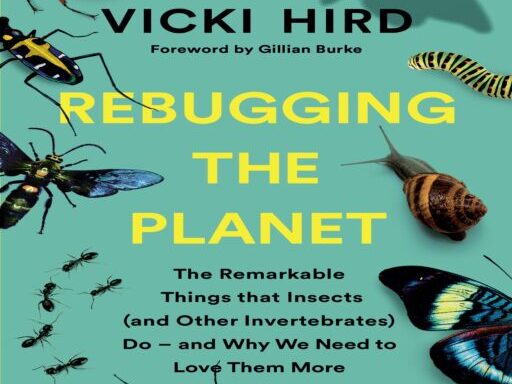You can help the bugs every day of the year.
This list is one I pulled together on a train 2 years ago after seeing some stark research on the loss of insects.
Actions range from teeny ones taking no time to major ones that could change your life. In my ‘Rebugging the Planet’ book these ideas are far more organised and with lots more detail and sources of help.
But have a look. See if you can or are ‘rebugging’ already…What more can you do?
- Eat organic foods if you can and support more sustainable farmers
- Wear organic cotton and buy organic materials (linen, timber…)
- Garden without pesticides – nature isn’t neat
- Talk about bugs and why they matter to your family and friends
- Tell your kids why bugs matter and avoid making them fearful
- Avoid pesticides in your home – use alternative methods if you really need to control them
- If you eat meat and dairy, eat less and better (like organic and pasture fed) meat to reduce your food footprint and support good livestock
- Eat less junk food and more fresh produce (junk foods are bad for planetary as well as your own health)
- Cut your plastic consumption, use refills for instance
- Join a great bug or wildlife organisation (see list in my book)
- Plant native wild flowers
- Don’t mow all the lawn – leave the dandelions and other flowers
- Cut climate change emissions in your life (flying, driving, make your house energy efficient)
- Support climate campaigns and push for action by governments (see list in my book)
- Avoid forest and wetland damaging products like palm oil, soya and peat
- Reuse timber and use recycled paper
- Grow some trees and bushes or support woodland trusts or local wildlife groups
- Grow your own veg without chemicals in pots or in the garden
- Email your MP to tell them to take action for insects and invertebrates
- Ask local park owners to cut pesticide, herbicide use in parks, streets, schools
- When flying ants or wasps arrive spread the love and counter the hate.
- Join your local friends of the park group and ask them to cut pesticide use
- Ask your local council to provide organic food in canteens, schools, care homes
- Ask local hospitals to source organic and local fresh food. Food for Life catering standard is good.
- Waste less food – its a waste of the land
- Eat free range dairy
- Join or starts a local bug and weed group to champion local spaces for bugs
- Buy fewer clothes and avoid artificial textiles clothes that create microfibres in soil and rivers
- Let the spiders live in your home, they will catch the flies.
- Don’t use neonicotinoid pet treatments for fleas etc
- Build up soil health in your garden (many insects live in it)
- Ask your local council or administration to plant more flowering plants and less cut grass.
- Ask your local council not to cut road verges, roundabouts etc when in flower
- If the council doesn’t respond, write to local paper, join local groups, use social media to make them
- Find out about local National Insect Week events in June and go along.
- If where you work has outside spaces, make them flower and insect friendly
- If you are at school or college get flowers or fruit and veg grown in buildings and the grounds
- Ask your school how they are promoting insect care with pupils
- Build some insect friendly habitats in home and garden like bee hotels
- Be untidy in your garden, drive, windowsill
- Get an insect tattoo to show the love (it can be temporary!)
- Take a picture of insects or other bugs you find and share the joy on social media – Instatwhatfacetubesnapchattwitter
- Join in citizen surveys like the great bee count
- If you see anything you think is maybe rare – check and send details to groups and scientists who use these sighting to track bug numbers.
- If you have an allotment (or a farm!) make it bug friendly and chemical free
- Never knowingly step on a bug
- Support campaigns like the Soil Association, Garden Organic, Nature Friendly Farmers Network, Organic Farmers and Growers, and LEAF who help farmers and growers to use alternatives to chemicals
- Check your pensions and investments are not supporting pesticide and herbicide manufacturing and habitat destruction (like peatlands or rainforest) Share Action can help.
- Dig a hole and bury some old wood for a stag beetle nest
- Always be a real bug and rebug the politicians. Often. Big changes need big government action.
